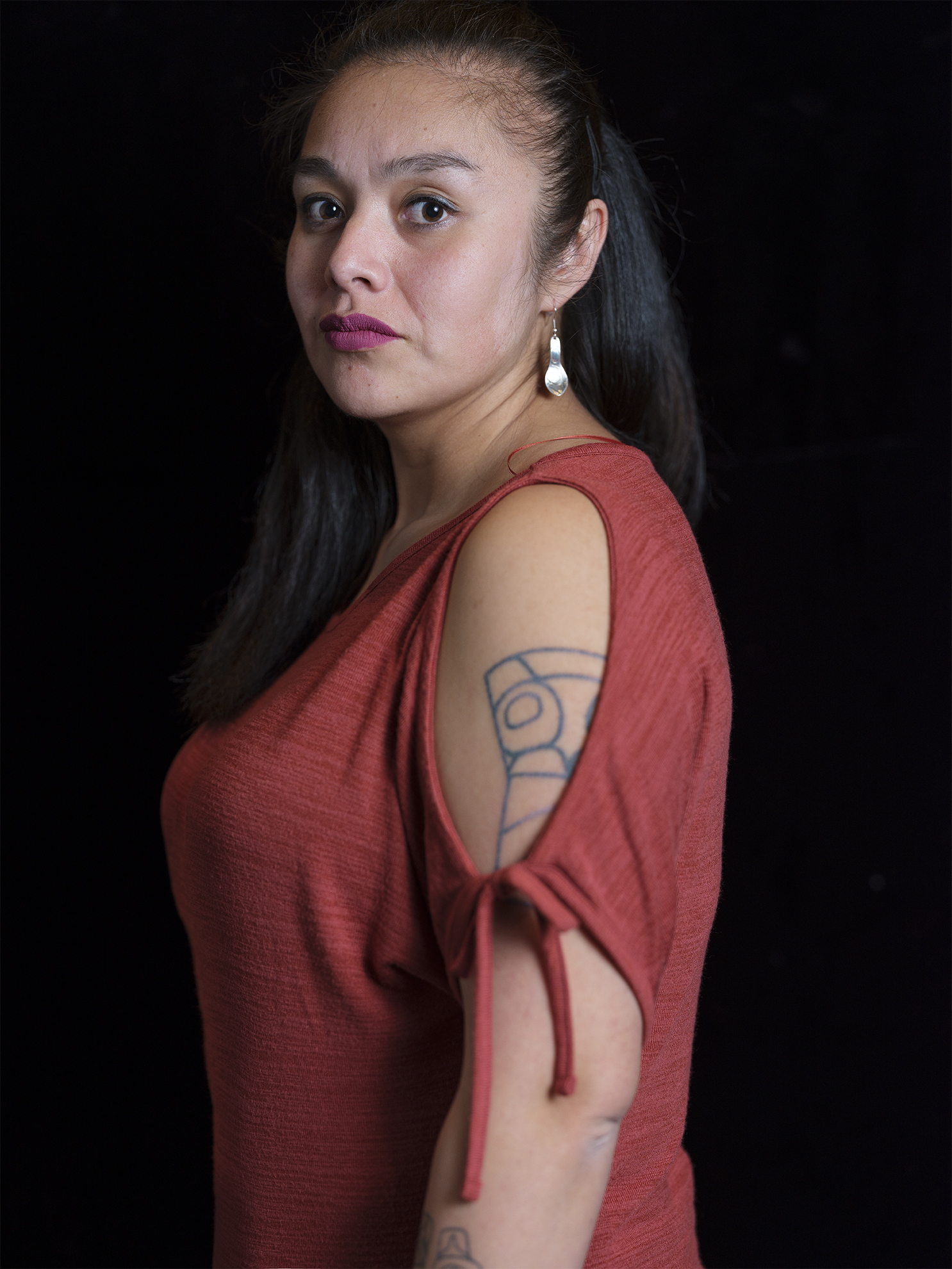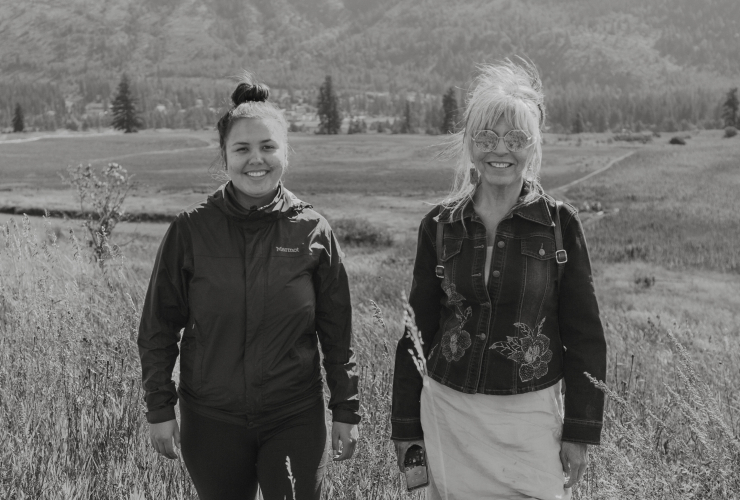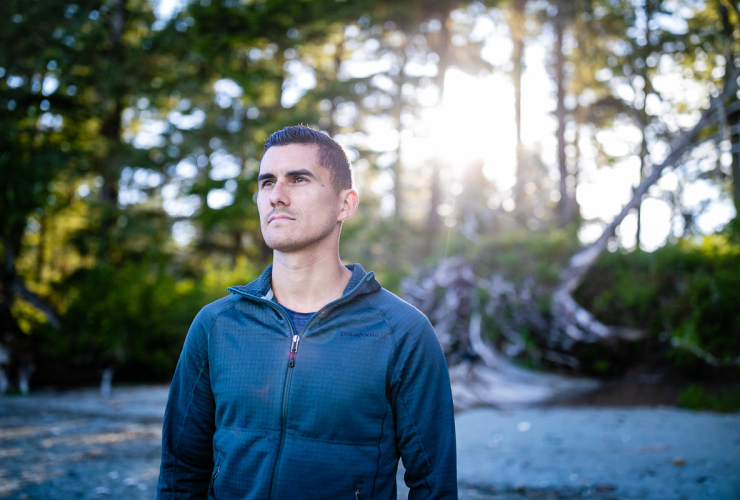Haida matriarchs are occupying two ancient village sites to protect against the devastating impact a COVID-19 outbreak would have on Haida Gwaii. Meanwhile, two luxury sport fishing lodges in the area have decided to open their doors to guests, following B.C. regulations, but disregarding Haida law.
“As a matrilineal society, the Gaandlee Guu Jaalang, 'daughters of the rivers,' are the Haida women who have the responsibility to protect Haida Gwaii,” stated a press release sent out by the group July 9. “The Haida people are asserting our inherent rights, according to our traditional ways, and ensuring food security during this global pandemic.”
During a First Nations Forward Facebook live interview, spokesperson Adeana Young called the COVID-19 pandemic “triggering” for Indigenous communities who have survived devastating diseases that have decimated populations.
“The smallpox epidemic was a sickness purposefully introduced to Haida villages to wipe the Haida people out,” Young said on July 17, just a day before the first confirmed COVID-19 case was announced on Haida Gwaii. “The risk of a COVID-19 outbreak on Haida Gwaii is devastating. This has been a trigger for many people.”
Meanwhile, two luxury sport fishing lodges operating in Haida territories have decided to reopen to wealthy clients, putting Haida people at greater risk, Young said.
Despite ongoing debate about the decision and strategy to reopen business as usual, West Coast Fishing Club and Queen Charlotte Lodge have both opened their doors and started hosting guests who are brought to the remote archipelago off the northwest coast of B.C. by private helicopter or boat.
The Queen Charlotte Lodge is just 10 kilometres from one of the village sites occupied by the Haida. The West Coast Fishing club is 45 nautical miles from the nearest community, only accessible by boat or air.
In an email response, Sarah Plank, communications director of B.C. Ministry of Indigenous Relations & Reconciliation, said the decision to move into Phase 3 of B.C.’s restart plan was made with the guidance of provincial health officer Dr. Bonnie Henry and the First Nations Health Authority.
“The First Nations Health Authority has been engaging closely with First Nations to support their response throughout the pandemic,” Plank wrote. “We have had ongoing dialogue for a number of weeks with Nations on the north-central coast about their concerns.”
Plank noted a half-day session last Friday where senior health officials, “including Dr. Henry, and community leaders from the Nations, came together to talk about solutions.”
“We agreed to continue to work collaboratively to build confidence and ensure protections for vulnerable community members as we move forward with the restart plan,” Plank wrote. “For all of us, the safety of everyone is our top priority, and we continue to believe the best way forward is through dialogue.”
But for Young, amidst ongoing dialogue, decisions with serious consequences have already been made by the companies and B.C., without consent by those who would be most impacted by an outbreak.
A statement made by the West Coast Fishing Club on July 10 said the company is complying with all the orders and guidelines issued by the province, health authorities, and WorkSafeBC.
“We have worked hard to eliminate all contact with the residents of Haida Gwaii and their communities through direct helicopter transportation from the mainland to our remote island and back,” wrote club president Brian Legge. “This includes all emergency evacuation plans as Haida Gwaii does not have the health-care infrastructure to accommodate, and anything else would have dire effects on the community.”
While the two companies have promised to respect federal and provincial safety regulations, there has been no mention of respecting Haida law, Young said.
“The Haida Nation has stated that during this pandemic that we will remain closed until it is safe to reopen. We're watching the world, we're watching B.C., we're watching how things roll out,” Young explained. “Until we feel like it's safe to open up again, we're not going to. And we're just asking that these lodges respect Haida law.”
The Haida Hereditary Chiefs Council added its voice to the conversation in a public statement released yesterday, directed specifically towards the Queen Charlotte Lodge, which the council claims has chosen profit over life.
“Since its arrival, the Queen Charlotte Lodge has treated this precious part of our homeland as little more than a playground for those who make money spoiling the Earth,” the council wrote. “QCL has been dishonest in its representations to the public and its patrons when they claim to be co-operating with the Council of the Haida Nation in the face of COVID-19.”
Queen Charlotte Lodge did not reply to a request for comment in time for publication of this story.
Communities on Haida Gwaii have made great sacrifices during these past months
Young's husband, a commercial fisherman, has had to stay home this season, losing profit that would usually make him eligible for benefits. Many fishermen, island businesses and families have suffered economic loss throughout this pandemic, Young said.
“He's not going to sacrifice lives for money,” she said. “The lodges have said they put millions of dollars into the local economy, but we're not talking about our economy, we're talking about human safety and well-being. We're not negotiating a profit margin, we're negotiating our identity, who we are as a people.”
Even the little ones understand the risk and have been taught to be respectful.

Haida cultural life has shifted entirely, as large groups could no longer gather for feasts, dancing and singing, and funeral ceremonies. People who usually come home, stay away, out of love and respect for their people.
“There are people who want to come home, people who would normally come home to harvest and help with food security in their urban communities, but they have decided to stay away and respect our wishes,” Young said. “They are sacrificing their family time, sacrificing their winter harvest. We have had funerals where people can't come home and pay respect to their loved ones. We have had to learn to adapt.”
There are two hospitals on Haida Gwaii and each can bed up to 12 patients, Young explained. But the beds aren't always empty, she said, and there are only two ventilators available.
“We can't handle an outbreak,” she said.
Inherent right to occupy our land
On July 9, following a number of community meetings, a group of matriarch-led Haida community members took the initiative to occupy their lands, set up a cabin, and harvest their traditional foods to help maintain food security.
The Haida Nation is a matrilineal society that holds its elder women in high esteem. Each clan has a matriarch, and each clan has supported their elder women to come out to their villages. When they aren't able, the younger women go out and help them, looking after their responsibilities.
“They have set up a kitchen there. They are eating the fish they catch every day. They're eating crabs and prawns, they're out there harvesting our berries and preserving and jarring our foods for winter,” Young explained. “Our communities have come together to make sure we're taking care of each other.”
“We are here, we never left, and we will continue to occupy our ancestral lands and waters.”
“We are Haida people living off the land as we have since time immemorial. Our presence goes deeper than the pockets of corporate operations that occur on our ancestral lands,” Adeana Young said during a Facebook live interview on July 17.
The presence of the sports fishing lodges in Haida territory has often been a place of tension, even before the coronavirus swept across the globe, Young said. The gravity of this year's global health pandemic has heightened the situation.
Ten years ago, Young worked at the West Coast Fishing Club as a chambermaid. She witnessed first-hand how guests are given a catch quota, and if they catch their limit quickly, they stay out on the water and play with the fish.
“It's a high mortality rate for our fish. They don't survive when they're played with,” she said.
Playing with your food goes against Haida laws of reciprocity and respect passed on through supernatural stories that have taught and governed her, her family and her people since time immemorial.
“We wish that these outsiders would respect our wishes and return the reciprocity we've given to them, return the respect we've given to them all these years, since they established themselves on our traditional territories, our traditional lands,” Young said.
There are a number of other businesses on the remote island that have made the decision to remain closed, until communities decide that it's safe to reopen.
Pandemics are not new to Indigenous peoples in so-called B.C., and the devastating impacts in Indigenous communities across the world heighten the responsibility to protect people's lives during these uncertain times.
COVID-19 has highlighted ongoing personal, collective, national and international social and political issues, including questions around rights, title, and jurisdiction in Indigenous territories.
Many Indigenous communities, from the north to the south, have suffered the consequences of deadly diseases brought unintentionally or intentionally into their homes — it's why nations like the Nuxalk, the Heiltsuk, and the Tla-o-qui-aht have asserted their right to remain closed to outsiders. It's why there has been public outcry against tourists visiting the Navajo Nation (where there has been over 422 COVID-19 deaths), and it's why the Haida nation continues to do what is necessary to protect their people.
Haida people are respectful people, reasonable people, Young said as she closed off the conversation in the same even and calm voice she held throughout the hour.
“We are a reciprocal people and when we are respected, we give respect back,” Young said. “All we ask, is that our wishes are respected. Haida Gwaii remains closed, no exceptions.”






Comments